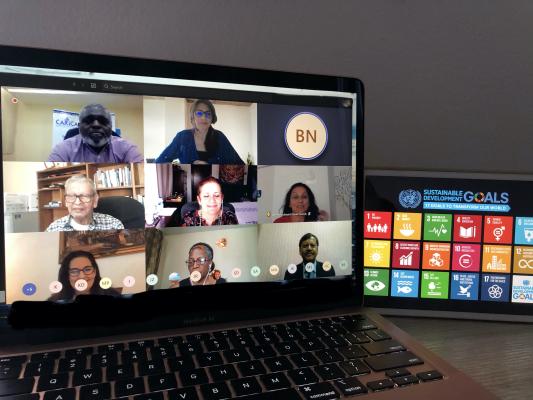
The UN DESA’s Global Initiative on Building Capacities of Public Servants for the Sustainable Development Goals (SDGs) Implementation, launched in 2018, aims at developing the capacities of governments and public servants (in terms of knowledge, skills, attitude, leadership competencies, and mindset) to support the implementation of the SDGs. It also aims to provide data and information about the development of capacities in the regions and support institutional capacity development for improved public service delivery and North-South and South-South exchange of effective governance practices to ensure cross-fertilization and mutual learning.
This initiative is expected, inter alia, to co-create with the schools of public administration (i) a curriculum on the 2030 Agenda and the SDGs, which includes several online and face-to-face training programmes, and (ii) a competency framework for public servants to implement the SDGs. It is also expected to help schools to mainstream the SDGs in their curricula and courses.
Every year a global meeting with the schools of public administration is held to take stock of their initiatives in terms of raising awareness of and mainstreaming the SDGs in their programmes and developing the necessary skills of public servants to respond to governments’ priorities in implementing the 2030 Agenda.
This year (2020), the third Annual Meeting of the Global Initiative on Building Capacities of Public Servants for SDG Implementation was conducted virtually on 27 July 2020. It was hosted by the Programme Management & Capacity Development Unit (PMCDU), Division for Public Institutions and Digital Government (DPIDG), United Nations Department of Economic and Social Affairs (UNDESA). Sixteen participants from schools of public administration, institutes of training, academia and government agencies from Africa, Asia and the Pacific, Europe, Latin America and the Caribbean and the Middle East took part in the meeting. The countries represented were Ethiopia, Ghana, Rwanda, Togo, Bangladesh, Bhutan, Nepal, Guatemala, Trinidad and Tobago, Egypt, and Lebanon, as well as regional institutions such as CARICOM in the Caribbean and ResPA in the Western Balkans.
The objective of the Annual Meeting is to share with the schools of public administration key updates on the Curriculum on Governance for the SDGs. It also aims at illustrating how they can share with the Curriculum Technical Group: (a) feedback and comments; (b) case studies; and (c) tools and methodologies to complement the training toolkits. During the previous meetings, topics of the Curriculum for Governance for the SDGs were already presented and discussed with the schools of public administration. A competency framework for public servants to implement the SDGs was also developed with the Members of the Asia and the Pacific Task Force. Schools of public administration will also have the opportunity to discuss how they will pilot the toolkits once completed and the next steps on the communications and outreach of the Curriculum on Governance for the SDGs.
 欢迎来到联合国,您的世界!
欢迎来到联合国,您的世界!